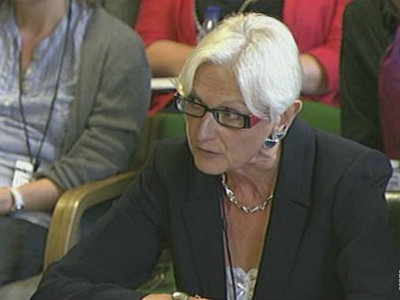
The outgoing head of the Care Quality Commission (CQC) has been forced to apologise for making public allegations about a whistleblower’s mental health.
Appearing before the Commons health committee, Dame Jo Williams withdrew a series of allegations she made about the mental health of CQC board member Kay Sheldon after MPs intervened over the “very personal” information being shared.
Sheldon, who has spoken out publicly about alleged poor leadership and safety issues at the regulator, said Williams’ testimony was a “gross misrepresentation of the facts.”
Giving evidence Williams, the CQC chair, said she felt a “duty of care” towards Sheldon. She claimed the whistleblower had been found in a toilet “distressed, not recognising her own name” and “completely wet through” after walking out of a board meeting last year.
Williams also claimed that Sheldon believed “everyone is talking about her” when she walked down the street.
MPs criticise “very personal comments”
After Labour MP Valerie Vaz complained that the CQC chair was making “very personal comments” about Sheldon’s mental health without the whistleblower having the chance to respond, Williams withdrew the comments. She later apologised for making the allegations public.
Sheldon, who remains on the CQC board after the health secretary decided she should stay in post, told Community Care that she had not given Williams permission to reveal the personal information. She said the CQC chair had given MPs a “distorted and partial” account of events.
Sheldon said she left the CQC meeting early due to having a “fever and headache” caused by a viral infection. She said she recovered from the illness within a few days.
“Furthermore I saw my GP and the in-house occupational health nurse after this, and neither expressed any concerns about my mental health. Neither did my family,” she said.
“I did not miss any of my various work commitments and the only arena that my mental health was questioned was at senior level in CQC,” she added.
Sheldon, who intends to carry on in her role on the regulator’s board and “change the culture of CQC from within”, said:
“I was appointed to the CQC board particularly to bring the perspective of people who use health and social care as well as my expertise in mental health. My experiences within CQC over the past year have been reminiscent of the time I was trapped in a service providing poor care – disregarded and stigmatised.”
“It is wholly unacceptable that a body, particularly one charged with protecting people in vulnerable situations, has behaved in this way.”
Sheldon gave highly critical evidence of the CQC’s leadership to the public inquiry into the monitoring of Mid-Staffordshire NHS Foundation Trust.
Williams, who announced her resignation as CQC chair last week but will stay in post until a replacement is found, said Sheldon’s decision to appear at the public inquiry had led to “a breakdown of trust”. She claimed that Sheldon could have made formal complaints to ministers rather than blowing the whistle publicly.
Writing on Twitter, MP and health committee member Sarah Wollaston said: “Jo Williams says she would have handled Kay Sheldon case ‘slightly differently’ then proceeds to disclose highly personal information.”
Adding to mental health discrimination
Mental health campaigners said any attempt to use someone’s mental health to discredit them as “unreliable” added to the stigma and discrimination faced by people with mental health problems.
Sue Baker, director of the Time to Change national campaign to end mental health discrimination, said:
“We cannot comment on the specifics of this case or the individuals involved. However, we do believe that it is wrong for a person’s mental health problems to be used to undermine their credibility or discredit evidence they are giving.”
A CQC spokesman said that the regulator had nothing to add to Williams’ testimony.
The Department of Health has been approached for comment.
Andy McNicoll is Community Care’s community editor

 Bournemouth, Christchurch and Poole
Bournemouth, Christchurch and Poole  Hampshire County Council
Hampshire County Council  Lincolnshire County Council
Lincolnshire County Council  Norfolk County Council
Norfolk County Council  Northamptonshire Children’s Trust
Northamptonshire Children’s Trust  South Gloucestershire Council
South Gloucestershire Council  Wiltshire Council
Wiltshire Council  Wokingham Borough Council
Wokingham Borough Council  Children and young people with SEND are ‘valued and prioritised’ in Wiltshire, find inspectors
Children and young people with SEND are ‘valued and prioritised’ in Wiltshire, find inspectors  How specialist refugee teams benefit young people and social workers
How specialist refugee teams benefit young people and social workers  Podcast: returning to social work after becoming a first-time parent
Podcast: returning to social work after becoming a first-time parent  Podcast: would you work for an inadequate-rated service?
Podcast: would you work for an inadequate-rated service?  Family help: one local authority’s experience of the model
Family help: one local authority’s experience of the model  Workforce Insights – showcasing a selection of the sector’s top recruiters
Workforce Insights – showcasing a selection of the sector’s top recruiters 

 Facebook
Facebook X
X LinkedIn
LinkedIn Instagram
Instagram
Comments are closed.